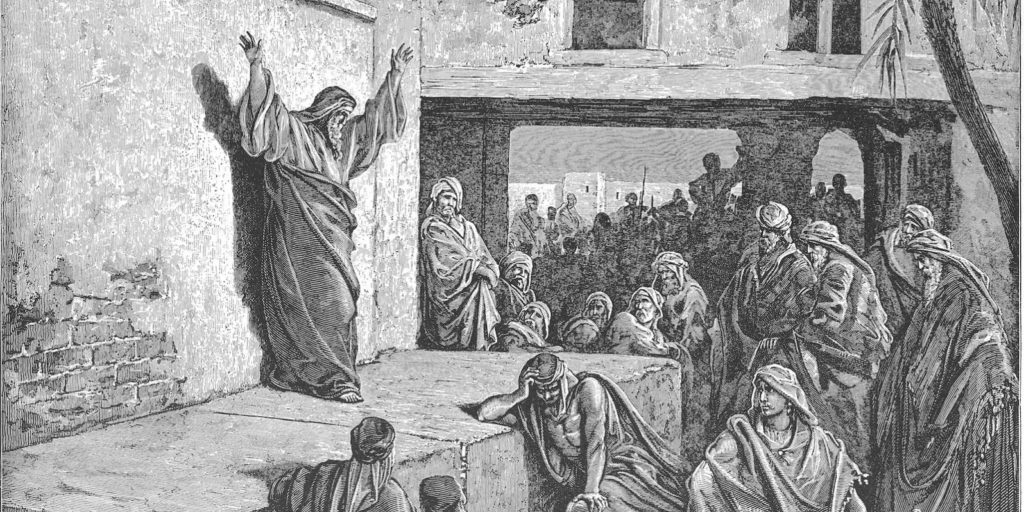
How to Read Micah Theologically
There is a growing movement in evangelical Christianity to read the Scriptures theologically. The umbrella term used to describe this sort of reading is, unsurprisingly, “theological interpretation of Scripture,” “TIS” for short. TIS has increased in popularity as evangelical scholars have become more dissatisfied with the “assured results of critical scholarship.” The historical-critical method, the darling of eighteenth- and nineteenth-century biblical studies departments, sought to situate the Bible within its historical-critical context. But it went about this endeavor with a presupposition that Scripture was not divinely inspired, that God is not active in supernatural ways, and that the Bible came about through an evolutionary process of editing and redaction. Not every result of historical-critical scholarship is bad, and there is much to be learned from the scholarly work of those centuries; nevertheless, the fruit of historical-critical scholarship is tainted with these anti-supernatural biases. When the church feasts on anemic fruit, it likewise grows anemic.
God is Author
Theological interpretation of Scripture aims to reorient biblical scholarship—and biblical devotion—by returning Scripture to its rightful owners, namely the church. This way of reading and interpreting Scripture, like historical criticism, starts with several presuppositions that are important for understanding why Christians should read the Bible theologically. First, this method “assumes some kind of communicative relation, mediated by the text, between the triune God and the church.”1 Simply put: God communicates with people through the Bible. Another way of saying this is that the Bible is divinely inspired: its words are not merely human words; instead, the words in the Bible are the very words of the holy God. Similarly, they Holy Spirit illumines Scripture.2 Without the Holy Spirit, we simply cannot rightly understand the Bible: “we are only good readers with God’s help.”3
Christ is Telos
Second, we read the Old Testament in light of the New Testament.4 The Old Testament tells the story of God’s relationship with his people in anticipation of the incarnation; the New Testament tells that same story in reflection on the incarnation. The Old Testament, therefore, is only rightly understood when we view it through the lens of the birth, life, death, and resurrection of Jesus Christ, the prophesied Messiah.
Church is Owner
The purpose of Scripture is for God to communicate with God’s people. It is the grand story of redemption, a story told for the purpose of revealing who God is and how it is that humans can and should relate to him and each other. As such, it belongs properly to God’s people. It is fine and good to study the Bible within the academy, but Christ didn’t die to redeem the academy; he died to redeem his church.
Micah Theologically
A good friend and pastor quipped, “How do you preach Micah for more than one week? It’s just judgment! destruction! death!” My friend has a bit of a point—the book is a bold, no-holds-barred condemnation of idolatry and injustice. Micah goes to great lengths to shake his audience awake—they have abandoned their God through rank idolatry and by cannibalizing his people. Such should not be! And Micah aims to ensure that it does not remain so. Though there are many theological themes that we could trace through the book of Micah, I think we can follow Jesus (see Matt 22:36–40) in categorizing Micah’s sermons under two headings: love God and love people. Micah interweaves the themes of loving God and loving people, but here I’ll divide them for simplicity’s sake.
Love God
The book opens with a terrifying picture of God’s judgment against his people. God himself will descend “from his holy temple” (Mic 1:2) in order to be the judge, prosecutor, and witness against his own people as they stand trial for their rebellion against him. At his descent “the mountains will melt . . . and the valleys will split open” (Mic 1:4). Specifically, God’s people have crafted idols and worshiped other gods, thus disgracing themselves by rejecting the God who rescued them from Egypt. In response, God threatens to utterly destroy his people and humiliate them before their neighboring nations.
One danger in reading passages like Micah 1, with their thick and terrifying imagery, is that we think this Old Testament God is too dark, too grim, and even too violent. Surely a loving God, such that we find in the New Testament, would not destroy his own children. But that type of reading flattens out the Old Testament and robs Christians of a fully orbed picture of who God is. In fact, God is so serious about right worship of him that the Father sent his Son to atone for sin, and now the Holy Spirit indwells believers. So if we are tempted to scoff at the promised judgment in Micah or to think that Christians do not face that same sort of judgment, we are deadly wrong. Since the Holy Spirit now dwells within us—giving us the ability truly to love God as the Old Testament saints could only long for—we stand even more condemned. In fact, God is so serious about right worship of him that the Father sent his Son to atone for sin, and now the Holy Spirit indwells believers. Click To Tweet
Therefore, may Micah’s indictments against Israel and Judah for not loving God stand as encouragements and warnings to believers today to love God rightly. As he rescued Israel from Egypt and made them his own people, he has rescued Christians from slavery to sin and death and made us his own people. Modern idols in the West certainly differ from the idols Israel and Judah worshiped, but we have idols nonetheless—those things to which we go for help and comfort and security when instead we should be going to God. Again, may Micah’s descriptions of God’s frightful power cause us to cast aside our idols and instead to, like Jesus commended, “love the Lord your God with all your heart and with all your soul and with all your mind” (Matt 22:37).
Love People
The command to love people can’t really be separated from the command to love God, for our relationship with God determines our relationship with others, and our relationship with others reflects our relationship with God. Idolaters will likewise dishonor God through poor treatment of others, and that is just what we see as Micah takes aim at God’s people for how they have treated the most vulnerable people in society. I’ll let Micah speak for himself before unpacking some of the significance of his words.
Woe to those who devise wickedness and work evil on their beds! When the morning dawns, they perform it, because it is in the power of their hands. They covet fields and seize them, and houses, and take them away; they oppress a man and his house, a man and his inheritance. (2:1–2)
If a man should go about and utter wind and lies, saying, “I will preach to you of wine and strong drink,” he would be the preacher for this people! (2:11)
Hear, you heads of Jacob and rulers of the house of Israel! Is it not for you to know justice?—you who hate the good and love the evil, who tear the skin from off my people and eat their flesh from off their bones, who eat the flesh of my people, and flay their skin from off them, and break their bones in pieces and chop them up like meat in a pot, like flesh in a cauldron. (3:1–3)
He has told you, O man, what is good; and what does the LORD require of you but to do justice, and to love kindness, and to walk humbly with your God? (6:8)
The above is but a sampling of the strong words the Lord has for the religious and political leaders of Israel. They have dishonored God first of all by worshiping idols and second of all by refusing to “do justice, and to love kindness” as it relates to the very people they were meant to protect. Instead of effecting justice on behalf of people who would lack access to it because of their station—orphans, widows, the foreigner, and the poor—the leaders of God’s people were instead taking advantage of those very people. And if he thought his readers didn’t quite get the picture, he used vivid, visceral imagery—the leaders, that is, those who should do justice for the lowly in society, were instead cannibalizing God’s people. Rather than protect the poor and the orphan, they flayed them. And rather than act on behalf of the widow and the foreigner, the leaders chopped them up for stew.
What would it look like if believers today saw ourselves in Micah’s words? If we took seriously his dire warnings about how we treat people? If we are going to take the Old Testament seriously as God’s revealed Word with ongoing application for Christians, then we must deal with Micah’s call for loving people, and not just the people with whom we share socioeconomic or ethnic status. The gospel demolishes the walls that humans would erect to divide the church, and therefore Christians today can heed Micah’s call for justice by working for it on behalf of the most vulnerable among us whom society readily exploits —the poor, the foreigner, the orphan, and the widow.
In sum, reading Micah theologically—with the conviction that God is its author, Christ is its telos, and the church is its owner—demonstrates the importance of loving God and loving people. And to the extent that we do the first, the second will follow. Likewise, not loving people well reflects that something has gone awry in our relationship with God.
*Russell Meek has a forthcoming commentary on Jonah, Micah, Nahum, and Habakkuk with the Kerux Commentary Series.
Endnotes
1 Brad East, “The Hermeneutics of Theological Interpretation: Holy Scripture, Biblical Scholarship and Historical Criticism,” International Journal of Systematic Theology 19.1 (2017): 31.
2 Ibid., 34
3 Ibid., 34
4 Ibid., 41

